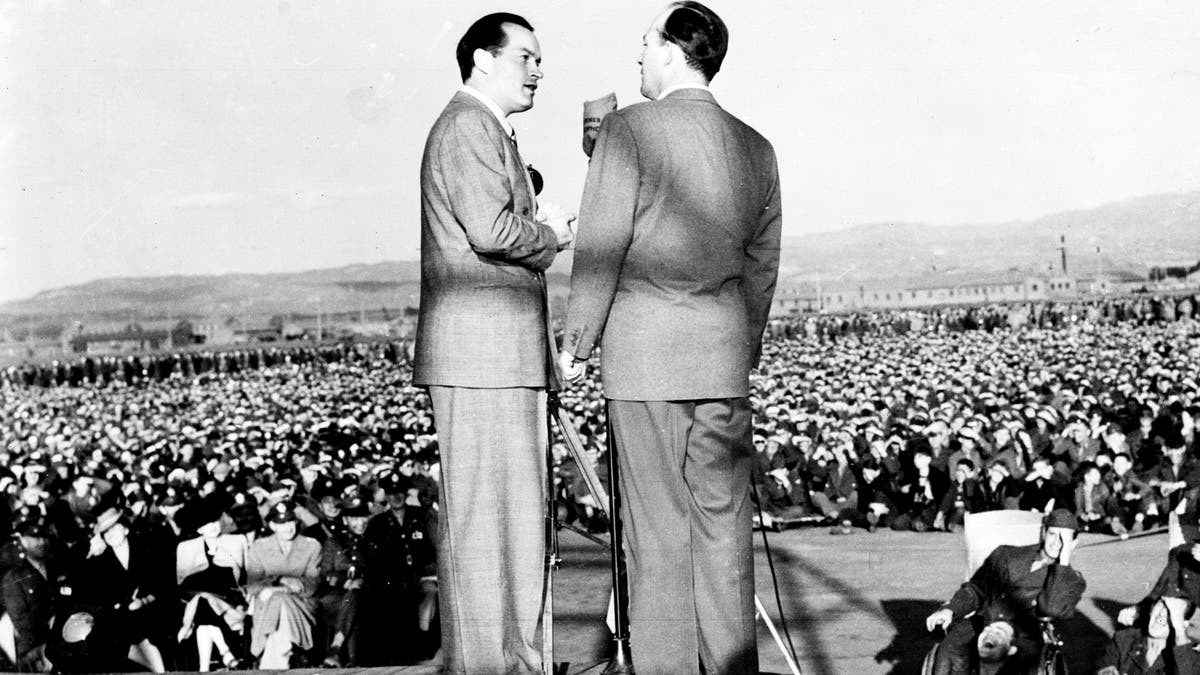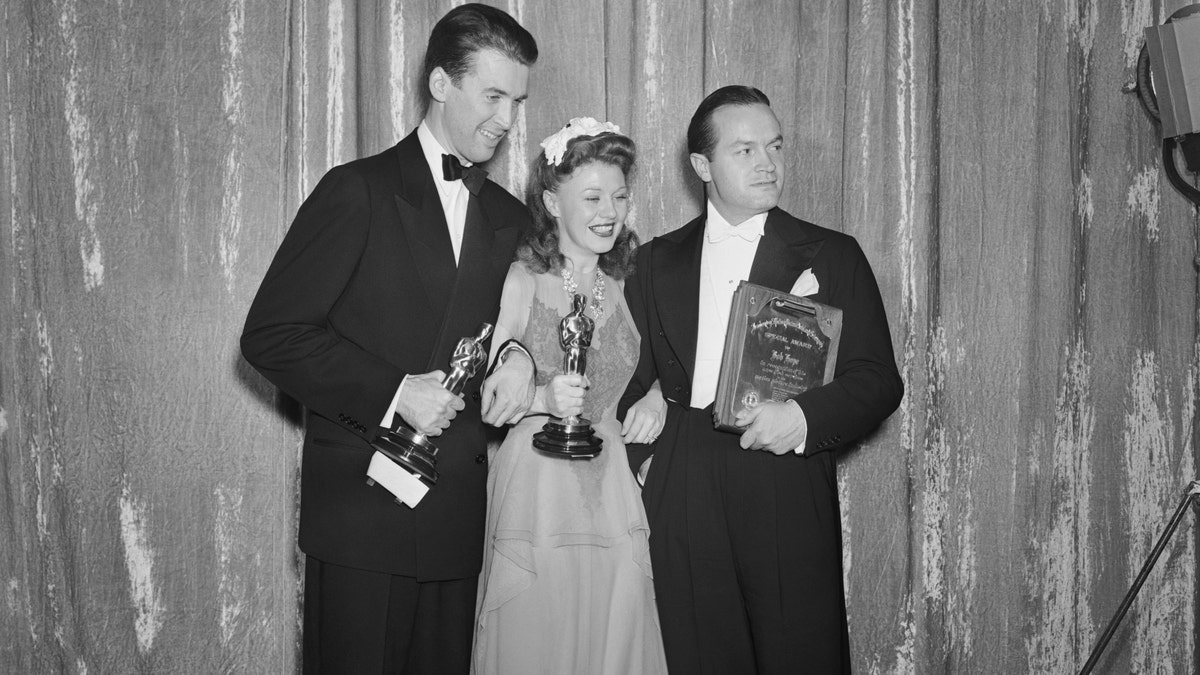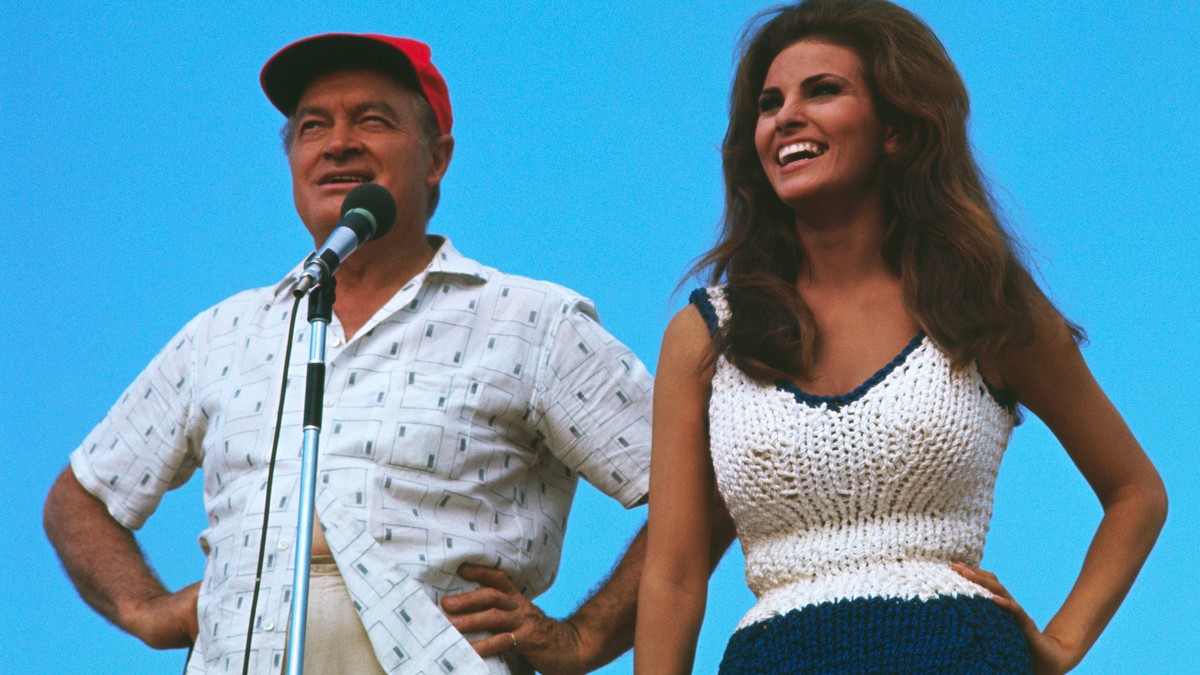Bob Hope, one of the most beloved figures in American culture and a titan of global entertainment, died in Los Angeles at age 100 on this date in history — July 27, 2003.
Leslie Townes Hope was born on May 29, 1903, in London and moved to Ohio with his family as a young boy.
He cemented his legacy in the hearts of the American people while entertaining millions of troops through four overseas conflicts, from World War II in the 1940s to his last show in 1990 before the Gulf War.
"The first and only American ever to be made an honorary Veteran of America’s Armed Forces, Bob Hope holds a special place in the national security pantheon," the Department of Defense wrote in a rare public statement upon the death of a civilian.
SINGER KELLY LANG ON HER 17-YEAR BREAST CANCER BATTLE: ‘I PROMISED GOD I’D BE A BRIGHT LIGHT TO OTHERS'
"Although he is no longer with us in life, he will always remain, just as he was, in our hearts — cracking jokes, boosting morale and reminding all the world of what it means to be an American."

Entertainers Bob Hope and Bing Crosby perform on a USO (United Service Organizations) Tour in front of U.S. troops, circa 1942. (Michael Ochs Archives/Getty Images)
Hope maintained a public pro-soldier stance during the Vietnam War, even as the conflict grew unpopular among many Americans and most notably among his colleagues in entertainment.
He performed nine straight Christmas shows for American GIs in Vietnam from 1964 to 1972.
President George W. Bush ordered that on the day of Hope's burial American flags fly at half-staff on all public buildings and grounds, including Naval vessels and military posts.
PRESIDENT, LAWMAKERS MOURN LOSS OF BOB HOPE
Hope sang, dance and acted, performing on stage, screen, radio and television and remains one of the world's most renowned stand-up comics.
He accumulated an astounding array of honors and accolades.

The 13th Annual Awards Dinner of the Academy of Motion Picture Arts and Sciences at the Biltmore Hotel. From left to right, James Stewart, Ginger Rogers and comedian Bob Hope after winning their movie awards. (Getty Images)
Hope hosted the Oscars a record 19 times from 1940 to 1978, received national citations from both President John Kennedy and President Lyndon Johnson, and was the first civilian to receive the Order of the Sword from the United States Air Force — which recognizes "significant contributions to the enlisted corps."
The beloved entertainer began his Broadway career performing in "Ballyhoo" in 1932.
Hope took his show outdoors, performing for a military audience at March Field in California.
He starred alongside W.C. Fields in the Hollywood production "Big Broadcast of 1938," the first of what would be 50 movies, during which he performed "Thanks for the Memories."
It remained Hope's signature song throughout his career.
BOB HOPE'S LETTERS TO TROOPS A TOUCHING REMINDER TO THANK VETERANS
He became a household name by hosting the nationally syndicated "The Pepsodent Show Starring Bob Hope," a radio variety program, from a Los Angeles studio.
CLICK HERE TO GET THE FOX NEWS APP
On May 6, 1941, as World War II raged across both oceans and America began to mobilize for its inevitable entry in the conflict, Hope took his show outdoors, performing for a military audience at March Field in California.
American entertainment would never be the same.

Comedian Bob Hope and actress Raquel Welch entertain American troops at an unidentified outdoor site in Vietnam, circa 1967. (Bettmann/Getty Images)
"That day, he discovered what would be his most cherished audience, the armed forces," notes So Ready For the Laughter: The Legacy of Bob Hope, a traveling exhibit offered by The National World War II Museum.
"During the war, only nine of Hope's 144 broadcasts were recorded in the studio. The rest were performed in front of troops," the exhibit reports.
CLICK HERE TO SIGN UP FOR OUR LIFESTYLE NEWSLETTER
"He was unwavering in his support of service members," the USO noted in a 2021 tribute to Hope.
"No matter the location or conflict."









































